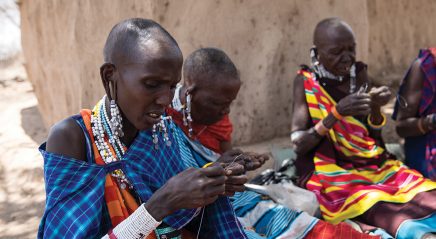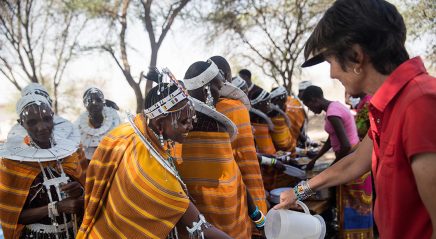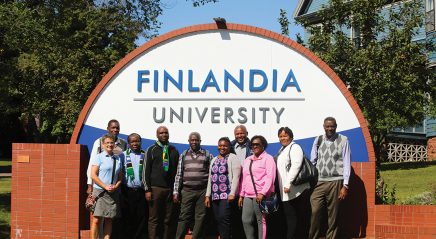The Mount Meru Coffee Project started with a one-word answer and has transformed into a massive undertaking of outreach and partnership between the Greater Milwaukee Synod and the Meru Diocese in Tanzania.
In 1999, a pastor from the Greater Milwaukee Synod embarked on a visit to Meru, a small town in the northern part of Tanzania and home to coffee farmers who struggled to make a living selling their beans to buyers. Most of these families belonged to the Meru Diocese of the Evangelical Lutheran Church in Tanzania.
During one of the discussions with the residents, many of whom lived on the volcano that provides Meru its name, one of the farmers asked: “We grow coffee; you drink coffee; will you buy our coffee?” The answer: yes.
That simple question became the foundation of the Mount Meru Coffee Project, a joint partnership between Lutherans from two cities tucked away in the quieter regions of their respective countries that has not only established a niche product of the synod but also lifted up the living conditions for farmers nestled on the mountain.
It has become the foundation of a lasting relationship between Milwaukee congregations that continue to learn about their siblings in Christ nearly halfway across the world in Meru, while farmers there gain new ways to provide for their families by selling to congregations in Milwaukee. But no one knew this would come about when the pastor returned home.
The project was born out of a need to sell coffee beans at rates that at least met the industry standard. Most of the farmers used parts of their land, about 1 to 3 acres, to grow coffee while the rest was used to sustain their households, said Ron Bohrer, who oversees the ambassadors for the coffee project. Because of the low yields and difficulty reaching the land compared to commercial farms across the globe, international buyers tended to overlook what was growing.
In questioning the pastor, the Tanzanian farmers sought a way to be paid a fair rate. But the cost of buying the beans and shipping them from the east coast of Africa to the Midwest proved to be greater than initially anticipated.
“The first import, which made no sense, was about 700 pounds per year,” Bohrer said. But they discovered with the early shipments that the beans weren’t comparable to the kind sold in red and blue cannisters throughout U.S. grocery stores. Instead, they were better. Roasters who cup the beans (evaluate the product) determined the Mount Meru beans were of a premium grade.
During discussions with the residents, one of the farmers asked: “We grow coffee; you drink coffee; will you buy our coffee?”
“We found out that we had a pretty good product here,” Bohrer said.
Meru isn’t easy to access for most people. And for the farmers near the dormant volcano, leaving the area doesn’t happen often. Access to the farms involves leaving roads, which negates the use of cars. The process can be more laborious than other agriculture, with the fruit being washed, de-pulped (the pit or bean is removed from the fruit), dried under the sun on 40-foot racks under oversight of the farmers’ wives to ensure the beans don’t get too much sun, and then stored before being hauled to the city.
Before the project started, most farmers were living off of $400 a year. “Some of the farmers were uprooting the trees because it wasn’t worth giving up the land,” Bohrer said.
But, with the high-quality product and the pastor’s promise, the project began. Jerry Schmidt, one of the group’s earlier leaders, realized there was great potential in selling the beans, but not from a financial perspective. He developed a two-part mission: raise awareness and familiarity of the Meru Diocese with Milwaukee-area congregations while also lifting up the livelihood of the farmers.
Schmidt and the project’s team created ambassador roles for each synod congregation. These members created content for church newsletters, bulletins and, later, emails while selling the beans in the narthex or fellowship hall each Sunday.
Congregants ordered their coffee between services. The ambassadors then sent the orders to the project’s offices, where the beans were ground and packaged to ship out by Tuesday, ready for pickup the next Sunday.
Schmidt’s plan worked. From over 700 pounds that first year, the Mount Meru Coffee Project has grown to ship 20,000 to 30,000 pounds of coffee each year, packaged in 132-pound sacks of green beans to ensure a longer shelf life. In Tanzania, farmers raised their standard of living, expanding their crops, adding water and electricity to their homes, and enabling their children to go to school past the public-mandated 12-year-old limit.
“A big part of the mission isn’t the coffee or how we got here, but to make our congregations aware of our brothers and sisters in our sister synod.”
For farmers, the project’s success is “enough to put fuel in the fire on our end because you know how their lives have improved,” Bohrer said.
The relationship between the synod and diocese has grown as well. Project leaders travel back and forth between Milwaukee and Usa River, the capital of the region where Mount Meru is located. Two coordinators in Tanzania work with the farmers to help them learn better farming practices. And, in coordination with the diocese, they maintain the Meru Specialty Coffee Growers Association, which not only helps manage the export laws that govern shipping the beans to Milwaukee but also allows the farmers to sell them at standard rates, or higher, should something happen to the project in the United States.
“It furthers our mission to help them so that they don’t have to rely on our sustainability,” Bohrer said of the association.
The mission work is a primary function of the project, not the sales they make in the United States. “A big part of the mission isn’t the coffee or how we got here,” he said, “but to make our congregations aware of our brothers and sisters in our sister synod [in Tanzania].”
That success has translated into further growth for the farmers through the Tanzanian Coffee Research Institute. Each year, more than 100 farmers travel to Moshi, in the neighboring Kilimanjaro Region, for a three-day training on techniques to improve their coffee-growing quality and quantity. The farmers return home with new methods to improve their yields but also receive disease-free and insect-resistant plants to expand their crops, which ensure sustainability for years to come. And, with the pandemic that has consumed the world, the timing couldn’t be better.
When the churches shut down because of COVID-19, the project’s model shifted. The pandemic forced the majority of the year’s revenue to come through website sales using a system installed just a couple of years earlier, increasing the project’s reach beyond Milwaukee to all parts of the United States.
Bohrer said sales have only increased since the pandemic hit in March, offsetting the decline from those within the synod’s congregations. This has enabled them to continue supporting the Meru farmers, furthering outreach to even more Americans and fostering stronger bonds between the two countries so ambassadors can continue to share stories of what the farmers in a town nestled in the northern corner of an East African nation are doing to congregants gathering in the northern part of the United States.
For more about the mission, the coffee, or about how to order from the project, please see mtmerucoffee.org.










